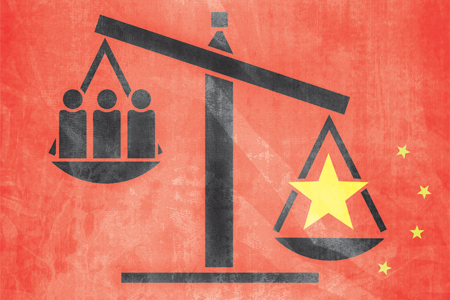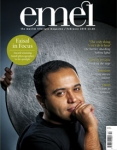
A Balance for China
Issue 65 February 2010
Two incidents in China suggest the Asian giant may have its own way of doing politics.
Two stories from a faraway country. The first involves Lou Jing, until recently a contestant on the Chinese reality TV talent show ‘Go Oriental Angel!’- a sort of Asian X-Factor. Her extraordinary singing voice pushed her almost to the final, but it was her appearance that really sparked interest in China.
Lou, the daughter of a Chinese mother and an African-American father, has dark skin and a beautiful but unusual combination of Oriental and African features. In China, a country that despite having fifty-six different ethnic groups is over 90% Han Chinese, such difference was fascinating and produced a debate on race in the country.
From Lou to Akmal Shaikh, the British man executed in December by the Chinese authorities for attempting to smuggle drugs into the country in 2007. His family and the British authorities maintained he was mentally unwell and urged China to carry out a medical assessment. Even the intervention of the UK at the most senior level could not make the government change its mind and Shaikh became the first European national to be executed in China in more than fifty years.
For at least the last two centuries, the majority of the world powers – those nations able to project force, and therefore their national will, overseas – have shared some things in common. Although by no means similar, Britain, America and France were at least watered by common European roots. The exception, for most of the last century, was Russia, which has alternated between a staunch wartime ally and a barely understood threat. What political strategists call the ‘inscrutable’ nature of Russia really reflects a lack of understanding of Russian society and the different influences that affect its political culture.
Now, with American unilateralism past its peak, the rise of China may prove an even harder nation to understand, even while we have less time to understand it.
To most of us in the West, China is distant but vaguely familiar. Its food appears on our street corners, its label on our clothes and electronics.Beyond that, Chinese culturehas not impacted our consciousness
as much as other parts of the world and immigrants from Chinese countries have not been as visible as other minorities.
There is a feeling in political circles that, although Chinese customs may be different, it is possible to draw the country’s leadership into the same modes of thinking that have governed Western relations with other countries.
But what the stories of Lou and Shaikh show us is that, as China becomes a world power, it will begin to have its own priorities. And those priorities may not match what we have come to expect in the world. Political priorities grow out of a society. True, a non-democratic country like China isn’t likely to be as swayed by the passions of the people, but the framework of ideas within which the population operates is going to be refl ected in its political decisions.
None of this means that China will be a threat. It does mean that China may do business differently and may have different priorities. On race, for example, the Chinese have a different experience to western European and North American countries, all of whom have taken in significant numbers of immigrants over the past fifty years. That experience has bred political debates about multiculturalism, about the degree to which new arrivals need to fit into the society and how they ought to do so, whether to assimilate entirely or to muddle along with little friction. The Chinese have not had such debates as yet.
On the question of human rights, which is how the story of Shaikh was framed, the Chinese appear to weigh rights differently: members of the public interviewed about the case seemed to feel that the collective need for a criminal to be punished outweighed his individual rights to have his mental health analysed. That may suggest a difference on how individual VS collective rights are framed.
These are complex questions and they will not be understood overnight. How far they affect China’s role in the world remains to be seen. But it is likely that the days when international political discourse is framed by the language of the European Enlightenment may be entering its final phase.
Faisal al Yafai is an awardwinning journalist and is a Churchill Fellow for 2009/10.
Bookmark this |
|
Add to DIGG |
|
Add to del.icio.us |
|
Stumble this |
|
Share on Facebook |
|
Share this |
|
Send to a Friend |
|
Link to this |
|
Printer Friendly |
|
Print in plain text |
|


Comments
0 Comments